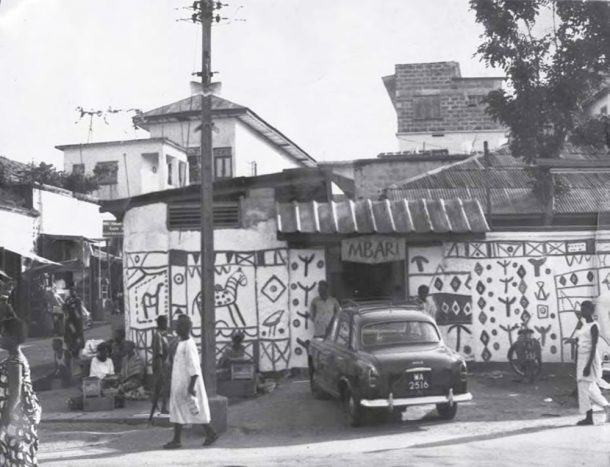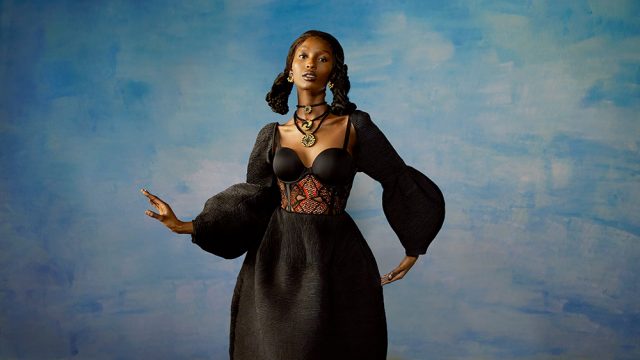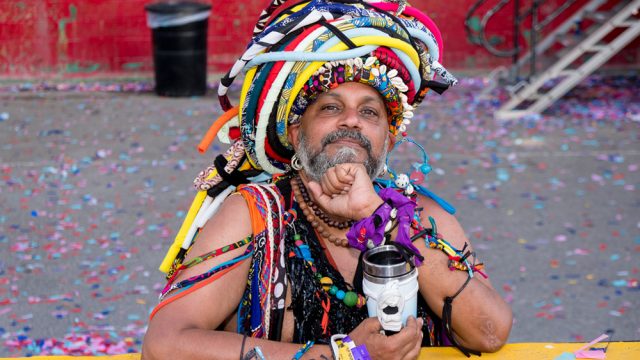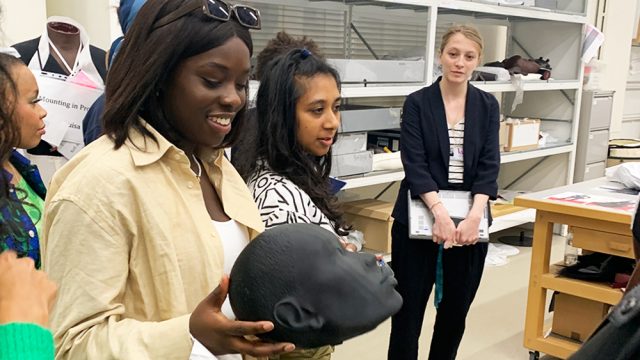Whilst researching for the Africa Fashion exhibition, one of the curatorial team’s favourite finds was the story of the Mbari Artists’ and Writers’ Club. It seemed to powerfully represent the energy, optimism, determination and creativity that flourished in the early 1960s in Africa, when dozens of countries were declaring independence from colonial rule. It embodied a defiant appreciation, celebration and cultivation of home-grown talent, work and style.

The Mbari Artists’ and Writers’ club was a creative group concerned with fostering and sharing art and culture by practitioners across the African continent. Established in Ibadan, Nigeria in July 1961 by writers Wole Soyinka, John Pepper Clark, Christopher Okigbo and Es’kia Mphahlele, artists Uche Okeke and Demas Nwoko, and academic Ulli Beier, the club sought to provide a creative hub for the exchange, appreciation, dissemination and discussion of Pan-African art, theatre, dance, music, poetry and writing.
For a membership fee of £1 (or 5 shillings for people living outside of Ibadan), Mbari members enjoyed plays, operas, poetry readings, lectures, and practical art courses as well as access to the club’s library. There were also exhibitions by artists such as Ibrahim El Salahi, Malangatana Valente Ngwenya, Vincent Kofi and Skunder Boghossian, as well artists from outside Africa such as Jacob Lawrence.
The club’s premises were on Onireke Road in the commercial heart of the city, near Dugbe Market. A former Lebanese nightclub, it had a courtyard that was converted into an open-air performance venue, as well as spaced for an art gallery, a library, and an office. Members could also order food and drink from the adjoining Lebanese restaurant when attending performances and events.
A further branch was established by playwright, actor and composer Duro Ladipo in 1962 in Osogbo, known as the Osogbo Mbari-Mbayo Club, which also housed an outdoor stage, a library and a bar. It was here that he hosted the debut performances of many of his works. A third branch opened in Enugu in 1963, and some histories of the club briefly refer to further branches in Lagos and Nsukka. Each branch operated independently, tailoring the exhibitions, events and output to the local communities. Nigerian musician Fela Kuti reportedly made his debut as a bandleader at the Mbari club in Ibadan, and in part modelled his own club, the Afrika Shrine in Lagos, Nigeria, after the Mbari clubs.
The name ‘Mbari’ was reportedly suggested by writer Chinua Achebe. Mbari is an Igbo word relating to the shrine houses built to honour the creator goddess Ala. A thorough explanation of the term ‘mbari’ is included in: Jeanne N. Dingome The Ibadan Cluster –
Mbari in European-Language Writing in Sub-Saharan Africa, edited by Albert S. Gérard, John Benjamins Publishing Company, 1986.
Mbari Publications
The Ibadan Mbari club included a publishing house, also established in 1961, which focused on publishing the work of emerging writers and artists from across the continent. The publishing house presented works in English and Yoruba, and translated some Francophone works into English. The house also became the publishers of Black Orpheus, the journal of African and African American literature established in 1957 and co-edited by Ulli Beier and (at various times) Janheinz Jahn, Es’kia Mphahlele, Wole Soyinka and Abiola Irele. Mbari Publications’ early years were prolific and wide-ranging:
‘In something under two years Mbari has brought out a short novel, four books of poems, a verse play, and two collections of drawings, representing work done in Nigeria, French Guinea, Sudan, South Africa, and Madagascar.‘
Denis Williams, “The Mbari Publications”, Nigeria Magazine, LXXV (1962), p. 70
An energised literary scene emerged during the liberation years as a fresh generation of writers told their stories on their own terms. Newly established African-owned publishing houses, such as Mbari, and the East African Publishing House, fostered young, talented writers who explored the realities and legacies of colonialism. Many titles received international popularity, presenting African perspectives to the world on an equal footing.
In total, Mbari Publications released 28 titles that included novels, short stories, poetry and plays as well as books of the work of fine artists and sculptors. These are listed below – those in bold are featured in the Cultural Renaissance section of the V&A’s Africa Fashion exhibition and are part of the National Art Library’s collection.
In 1965 the Ibadan club moved premises to Central Hotel, Oyo Road (a decision that caused disagreement amongst the managing members), and the publishing operation moved to the Osogbo branch. The outbreak of civil war in 1967 disrupted the clubs’ operations and forced many members to relocate or leave the country. Wole Soyinka was jailed as a political prisoner for 22 months.
All publishing activity had ceased by the early 1970s, despite some efforts by Abiola Irele and Hans Zell, via the University of Ife Press, to reignite the operation.
Works published by Mbari Publications between 1961 and 1965 (Those in bold are featured in the Africa Fashion exhibition):
Léon Damas, African Songs of Love, War, Grief and Abuse, 1961, illustrated by Georgian Betts
Bakare Gbadamosi, Oriki, 1961
Uche Okeke, Drawings, 1961
J. P. Clark, Songs of a Goat, 1961
J. P. Clark, Poems, 1962
Ibrahim El-Salahi, Drawings, 1962
Christopher Okigbo, Heavensgate, 1962, illustrated by Demas Nwoko
Alex La Guma, A Walk in the Night, 1962
Jean-Joseph Rabearivelo, 24 Poems, 1962
Dennis Brutus, Sirens, Knuckles, Boots, 1963, illustrated by Denis Williams
Wole Soyinka, Three Plays, 1963, illustrated by Denis Williams
Ulli Beier, Yemi Bisiri: A Yoruba Brass Caster, 1963
Malangatana Valente Ngwenya, Drawings, 1963
Felix Tchikaya U’Tamsi, Brush Fire, 1964
Christopher Okigbo, Limits, 1964, illustrated by Denis Williams
Kofi Awoonor [George Awoonor-Williams], Rediscovery and other Poems, 1964
Lenrie Peters, Poems, 1964
Duro Ladipo, Three Yoruba Plays [Qba Koso / Qba Moro / Qba Waja], 1964
Ulli Beier and Bakare Gbadamosi, The Moon Cannot Fight: Yoruba Children’s Poems, 1964
Akin Euba, Igi Nla So. For Yoruba Drums and Piano, 1964
Akin Euba, Three Songs. For Voice, Piano and lyalu Drum, 1964
Gerhard Kubik, Alo. Yoruba Children’s Songs, 1964
Okogbule Glory Nwanodi, Icheke and other Poems, 1964
Kola Ogunmola, Ife Owo (Love of Money), 1965
Bakare Gbadamosi, Oro Pelu idi re (Yoruba Words and their Meanings), 1965
Ulli Beier, Olatunde Asiru, a new Yoruba Artist, 1965
Duro Ladipo, Eda, 1965
Further Reading
Currey, James, Literary Publishing After Nigerian Independence: Mbari as Celebration, Research in African Literatures, 44(2), 2013
Dingome, Jeanne N. The Ibadan Cluster – Mbari, in European-Language Writing in Sub-Saharan Africa, edited by Albert S. Gérard, John Benjamins Publishing Company, 1986
Malz, Isabelle and Nadine Siegart, The Mbari Artists and Writer Club in Ibadan, Iwalewa books, 2018
Suhr-Sytsma, Nathan, Mbari Publications and the CIA, Poetry, Print, and the Making of Postcolonial Literature, Cambridge: Cambridge University Press, 2017
Ulansky, Gene, Mbari – The Missing Link, Phylon, Vol. 26 (3), 1965
Yesufu, Abdul R., Mbari Publications: a pioneer Anglophone African publishing house, African Book Publishing Record, Vol 8 (2), 1982


